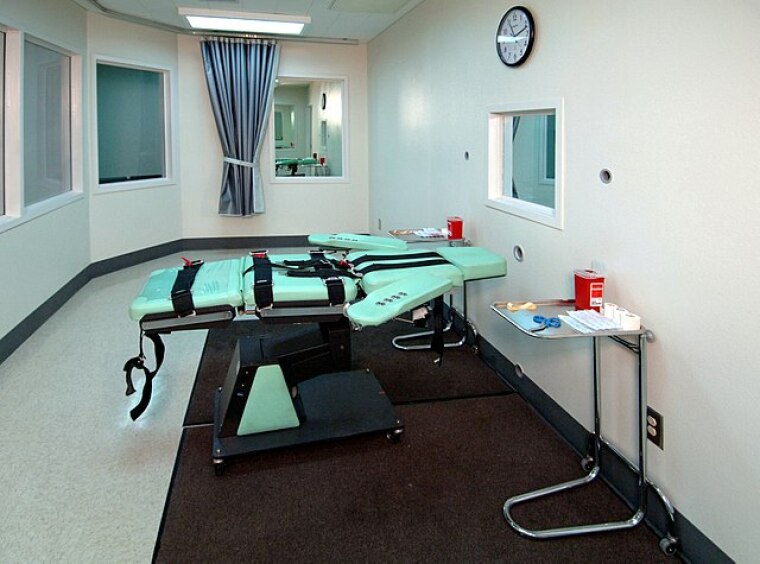Convicted murderer sings Christian hymns before execution

An Ohio man who was convicted of killing two people in back-to-back robberies in suburban Cleveland in 1992 sang Christian hymns as he was executed on Wednesday.
Gary Otte, 45, was executed by lethal injection at the Southern Ohio Correctional Facility in Lucasville and was declared dead at 10:54 a.m., The Associated Press reported.
Before he was injected with a lethal combination of three drugs, Otte apologized to the relatives of his victims and sang the religious song "The Greatest Thing," with words such as "I want to know you Lord" and "I want to serve you Lord."
He quoted the Bible with his last words: "Father, forgive them for they know not what they're doing. Amen."
Otte was the second person to be executed in Ohio this year after the state ended its three-year execution hiatus prompted by difficulties finding drugs to use in capital punishment.
He was sentenced to death for fatally shooting Robert Wasikowski and Sharon Kostura in two separate home invasion robberies in February 1992.
According to authorities, Otte had asked to go inside Wasikowski's he shot the 61-year-old man and stole about $400.
The next day, he forced his way into the apartment of Kostura in the same building, shot her and stole $45 and her car keys.
Otte's public defenders claimed that his drug addiction, intoxication and depression led to the killings, and that he had poor legal assistance at trial.
County prosecutor Michael O'Malley noted in a Jan. 30 filing with the parole board that the killings were not spur-of-the moment decisions by Otte, who lingered in the victims' apartment to rob them and turned up the volume of the TV to drown out Kostura's pleas for help.
In his last-ditch appeals, Otte claimed that the use of the execution sedative midazolam is unconstitutional and he contended that he should not be put to death because he was under 21 when he committed the crimes. His attorneys argued that the drug may not render prisoners so deeply unconscious that they avoid suffering pain when the last two drugs are administered.
The anti-execution activist Sister Helen Prejean also testified that he has a low IQ and psychological problems. However, both the U.S. Supreme Court and the state's highest court denied the appeals to halt the execution.
A spokeswoman for the prison system said that he did not sleep overnight, spending his last hours visiting with his parents and calling friends and family. The last meal he ate included a mushroom and Swiss cheese hamburger, a quart of Health Bar ice cream and a slice of banana cream pie.
 Christians don't have to affirm transgenderism, but they can’t express that view at work: tribunal
Christians don't have to affirm transgenderism, but they can’t express that view at work: tribunal Archaeology discovery: Medieval Christian prayer beads found on Holy Island
Archaeology discovery: Medieval Christian prayer beads found on Holy Island Presbyterian Church in America votes to leave National Association of Evangelicals
Presbyterian Church in America votes to leave National Association of Evangelicals Over 50 killed in 'vile and satanic' attack at Nigerian church on Pentecost Sunday
Over 50 killed in 'vile and satanic' attack at Nigerian church on Pentecost Sunday Ukrainian Orthodox Church severs ties with Moscow over Patriarch Kirill's support for Putin's war
Ukrainian Orthodox Church severs ties with Moscow over Patriarch Kirill's support for Putin's war Islamic State kills 20 Nigerian Christians as revenge for US airstrike
Islamic State kills 20 Nigerian Christians as revenge for US airstrike Man who served 33 years in prison for murder leads inmates to Christ
Man who served 33 years in prison for murder leads inmates to Christ


 Nigerian student beaten to death, body burned over ‘blasphemous’ WhatsApp message
Nigerian student beaten to death, body burned over ‘blasphemous’ WhatsApp message 'A new low': World reacts after Hong Kong arrests 90-year-old Cardinal Joseph Zen
'A new low': World reacts after Hong Kong arrests 90-year-old Cardinal Joseph Zen Iran sentences Christian man to 10 years in prison for hosting house church worship gathering
Iran sentences Christian man to 10 years in prison for hosting house church worship gathering French Guyana: Pastor shot dead, church set on fire after meeting delegation of Evangelicals
French Guyana: Pastor shot dead, church set on fire after meeting delegation of Evangelicals ‘Talking Jesus’ report finds only 6% of UK adults identify as practicing Christians
‘Talking Jesus’ report finds only 6% of UK adults identify as practicing Christians Mission Eurasia ministry center blown up in Ukraine, hundreds of Bibles destroyed: 'God will provide'
Mission Eurasia ministry center blown up in Ukraine, hundreds of Bibles destroyed: 'God will provide' Church holds service for first time after ISIS desecrated it 8 years ago
Church holds service for first time after ISIS desecrated it 8 years ago Burger King apologizes for 'offensive campaign' using Jesus' words at the Last Supper
Burger King apologizes for 'offensive campaign' using Jesus' words at the Last Supper Uganda: Muslims abduct teacher, burn him inside mosque for praying in Christ’s name
Uganda: Muslims abduct teacher, burn him inside mosque for praying in Christ’s name